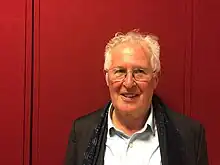Peter Geschiere
Peter Lein Geschiere (born 1941) is a Dutch anthropologist, Africanist and Emeritus Professor of Anthropology at the University of Amsterdam.[1][2] He studied at the Free University of Amsterdam obtaining a MA in history in 1967, a MA in anthropology in 1969, and a PhD in anthropology in 1978. Geschiere performed field work in Tunisia, Zaire, French- and English-speaking Cameroon and Senegal (1968-2001), and was a lecturer (1969-1978) and senior lecturer (1978-1988) at the Free University of Amsterdam. Then he held a professorship in Non-Western History at Erasmus University Rotterdam (1985-1988) and was a researcher at the African Studies Centre Leiden (1986-1988). At Leiden University Geschiere worked as Professor of Anthropology and Sociology of Sub-Saharan Africa (1988-2002). From 2000 onward he was Professor of Anthropology at the University of Amsterdam.[3] Geschiere specialised on Cameroon and the comparative study of processes of change in Africa.[4] In 2002 he won the Distinguished Africanist Award from the US-based African Studies Association.[5]
Peter Geschiere | |
|---|---|
 Geschiere in 2019 | |
| Born | 1941 |
| Nationality | Dutch |
| Academic work | |
| Discipline | Anthropologist |
| Sub-discipline | African Studies |
Publications
Geschiere published many scholarly books and articles, including[1][4]
- Stamgemeenschappen onder Staatsgezag, Veranderende Verhoudingen in de Maka Dorpen (Z.O. Kameroen) sinds 1900, PhD thesis 1978 in Dutch. Amsterdam: Free University, 1978. Published in English as Village Communities and the State, Changing Relations among the Maka of Southeastern Cameroun since the Colonial Conquest, London/Boston: Kegan Paul International. Monographs African Studies Centre, 1982.
- with Wim van Binsbergen, eds.: Old Modes of Production and Capitalist Encroachment. Anthropological Explorations in Africa, London: Kegan Paul. Monographs from the African Studies Centre, 1985.[6]
- The Modernity of Witchcraft, University of Virginia Press, 1997.
- with Birgit Meyer: Globalization and identity : dialectics of flow and closure, Blackwell Publishers, Oxford, UK, 1999.
- with Birgit Meyer and Peter Pels, eds.: Readings in Modernity in Africa - Readings in African Studies, Indiana University Press. ISBN 9780253351760, 2008.
- The Perils of Belonging: Autochthony, Citizenship and Exclusion in Africa and Europe, University of Chicago Press, 2009.
- with Patrick Awondo and Graeme Reid (Human Rights Watch): Homophobic Africa? – Towards a More Nuanced View, African Studies Review 55(2012), 145-168.[7]
- Religion’s Others: Jean Comaroff on Religion and Society, Religion and Society, 3(2012), 17-25. Special issue on Jean Comaroff's anthropology of religion.
- Witchcraft, Intimacy and Trust – Africa in Comparison, University of Chicago Press, 2013.
References
- "Prof. dr. P.L. (Peter) Geschiere, Faculty of Social and Behavioural Sciences, Dep. Sociology & Anthropology". uva.nl. University of Amsterdam. Retrieved 25 August 2022.
- "Peter Geschiere". ascleiden.nl. African Studies Centre Leiden. Retrieved 25 August 2022.
- van der Kwaak, Anke; Spronk, Rachel; Willemse, Karin (2005). Curriculum Vitae of Peter Geschiere, in: From modern myths to global encounters. Belonging and the dynamics of change in postcolonial Africa. A Liber Discipilorum in honour of Peter Geschiere. Leiden: CNWS Publications. pp. 200–214. ISBN 90-5789-105-0.
- "Prof.dr. P.L. (Peter) Geschiere". narcis.nl. DANS, Data archiving and networked services. Narcis. Retrieved 25 August 2022.
- "Distinguished Africanist Award Winners". africanstudies.org. African Studies Association. Retrieved 25 August 2022.
- Guyer, Jane I. (1987). "Reviewed Work: Old Modes of Production and Capitalist Encroachment: Anthropological Explorations in Africa by Wim van Binsbergen, Peter Geschiere. The International Journal of African Historical Studies Vol. 20, No. 1 (1987), pp. 121-123". jstor.org. JSTOR 219295. Retrieved 25 August 2022.
- Awondo, P.; Geschiere, P.; Reid, G. (2012). "Homophobic Africa? – Towards a More Nuanced View" (PDF). pure.uva.nl. University of Amsterdam. Retrieved 25 August 2022.
The recent emergence of homosexuality as a central issue in public debate in various parts of Africa has encouraged a stereotypical image of one homophobic Africa...
.
External links
Videos:
- Peter Geschiere: The 'Witchcraft of the House' Goes Global on YouTube. Kristian Lindegaard Svendsen. Video of a lecture on 4 December 2012 at Aarhus University. Duration 1h:41m:10s.
- Peter Geschiere. Livre 1. « Mon opinion sur l’anthropologie contemporaine et celle du passé, et ma propre trajectoire » on YouTube. Les Possédés et leurs mondes. Video of an interview by Frédéric Laugrand on 9 September 2021 at Amsterdam. Duration 26m:29s. In French.